#slasher!lamb
Note
Really stupid idea:
Narinder and Mary go on dates for the sole purpose of constantly trying to kill each other


That would go about as well as you think it would
#cotl#cult of the lamb#cotl narinder#cotl lamb#cult of the lamb narinder#cotl comic#asks#cotl slasher au#slasher!narinder#slasher!lamb#this took jkhkg so long to draw and then i go 'why the hell did this take hours it's not even coloured' and watch the replay and#it's 1+ hour of me drawing the bg alone kjerjg yeah that checks out#also this ask is old hi amber from the past#cw blood#cw poison
466 notes
·
View notes
Text
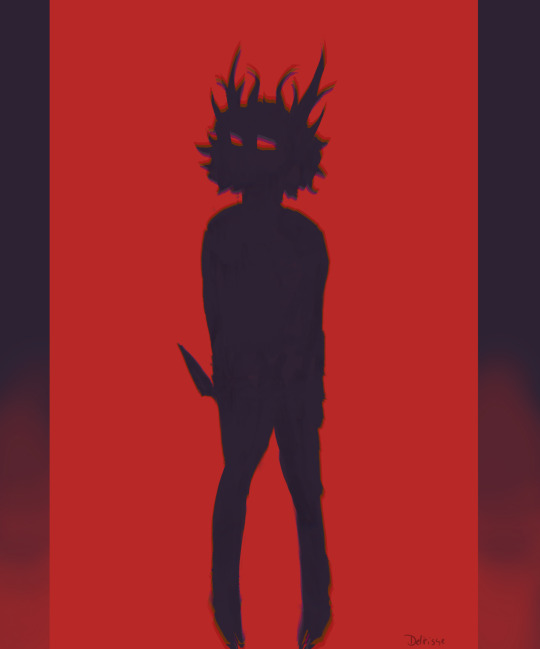
Inspired by Demon Mode album art
#cotl#cult of the lamb#cotl lamb#cotl slasher au#slasher!lamb#cw: knife#can’t help myself the album art looks so cool#jubilart#cw eye strain
51 notes
·
View notes
Photo
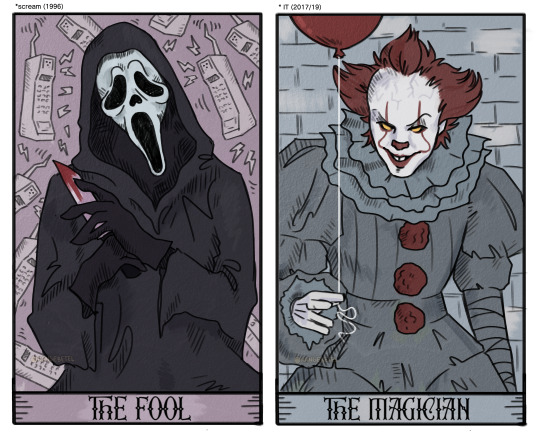
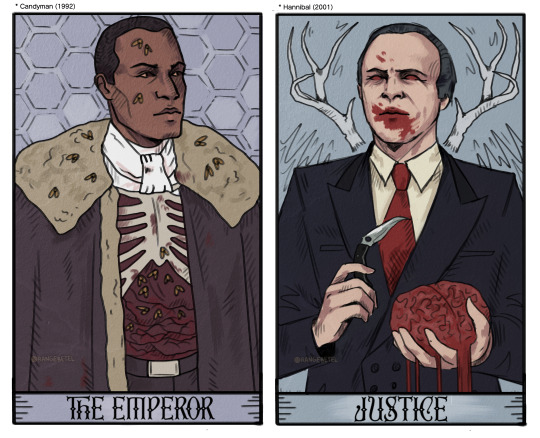



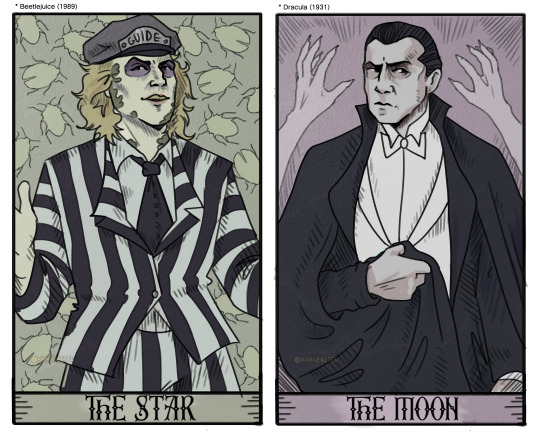
I designed some mock tarot cards based around my favourite horror characters for halloween! Just for fun; not intended for use :)
#ghostface#hannibal#silence of the lambs#the silence of the lambs#beetlejuice#dracula#slashers#michael myers#jsaon vorhees#tarot cards#pennywise#it#hellraiser
20K notes
·
View notes
Text
♡ slashers scenarios | sharing a bed (part two)
♡ fandoms; Friday the 13th, House of Wax, Black Christmas, Scream (kinda), Hannibal (TV), Dead by Daylight, slashers (general)
♡ characters; Jason Vorhees, Bo Sinclair, Billy Lenz, Danny Johnson, Hannibal Lecter
♡ reader; gender neutral
♡ cw; heavily suggestive content, implied smut, unhealthy power dynamics, references to stalking and kidnapping, violence
♡ notes; still kind of figuring out characterization for Jason and Danny tbh
•┈••✦ ❤ ✦••┈•
Jason Vorhees

> mama always taught him that sharing a bed with someone was wrong
> it could so easily lead to sinning! and the woods tended to be humid anyway, so it’d get sticky and sweaty
> but Jason likes keeping you close, very close
> the only time he’s not by your side is when he’s “working”
> and even then he’ll check up on you throughout the evening
> one day you get worried, though
> he’s usually back by the time you’re about to go to sleep- he drinks tea with you and usually cuddles for a bit even though he’s convinced staying would be bad
> on this night, the tea is getting cold, and you’re getting grumpy, so you step outside to call for him
> it’s just a moment- a split second that you feel a hand on your shoulder- too small to be Jason
> then there’s a sickening squelch, a scream, and a couple more wet thumps and groans before silence
> you don’t need to turn to know what happened, instead letting Jason come to you (he doesn’t like seeing you sad from his messes- and you don’t like seeing them period)
> he’s got the blood of the man who touched you splattered all over you but you just frown softly “…it’s bedtime.”
> he wordlessly nods and scoops you up quickly, seeming scared that you were somehow hurt
> you quietly reassure him but he gets you the tea and pets your hair until he’s satisfied you’re okay
> you relish in the affection and get an idea
> “Jason baby? can you sleep in my bed? just tonight?”
> you can tell he mulls it over a long while before he nods
> he looks comically large in your bed, holding your teddy bear for you while you change into pajamas
> you let him be the little spoon, wrapping around him happily
> surely something this comfy can’t be wrong, he decides and falls asleep peacefully
> but when he wakes up, holding your soft, barely clothed form tight against him…he realizes he doesn’t care what’s wrong and right when it comes to you
> because you make him want to do all of the things mama said not to - and he just loves making you happy
Bo Sinclair

> you like your personal space- that’s something you made clear when you started living there
> back then you were still a victim, but the point stands
> so once they trusted you you got your own little room and let you decorate
> and you like your arrangement. you have your bed, your boyfriend has his, and you don’t ever sleep in the other’s on purpose
> why would you want to sleep next to Bo anyways? he snores, he’s always splayed out in weird positions and he sweats like a motherfucker
> maybe it had to do with the way you can always hear him screaming when he wakes up in the middle of the night.
> or how it stings whenever he leaves after you fuck, even though you never really ask him to stay
> okay, fuck it. you love the idiot and you want to sleep next to him.
> that shouldn’t be too hard to say
> except it is, because your stubbornness is almost as legendary as Bo’s
> you’re still actively putting it off when you manage to sprain your ankle in the house
> after thanking Vincent for patching you up, you spend the afternoon in the living room, sulking as you wait for Bo
> you know it’s not his fault you slipped, but you’re irrationally mad at him and getting worse the later that he is
> you can tell Vincent got to him first because he’s already frowning when he walks in to the living room close to midnight
> “what happened to you, little darlin?”
> your anger immediately melts away and you give a pathetic little pout as he hugs you tight, cursing for not checking in
> he babies you throughly and eventually takes you to your room
> he’s giving you a goodnight kiss when you grab his sleeve
> “…stay?”
> he can’t hide his smug smile
> “…you want me to?”
> you grumble but he’s happy to strip to his boxers, whistling
> “what’re you so smug for?”
> “you finally asked me to stay.”
> “…well duh.”
> he falls asleep with your whole body laid on top of him, hand lazily stroking your hair
> for once he doesn’t have any night terrors, and he’s grateful
> so grateful in fact, he’d like to repay you..
Billy Lenz
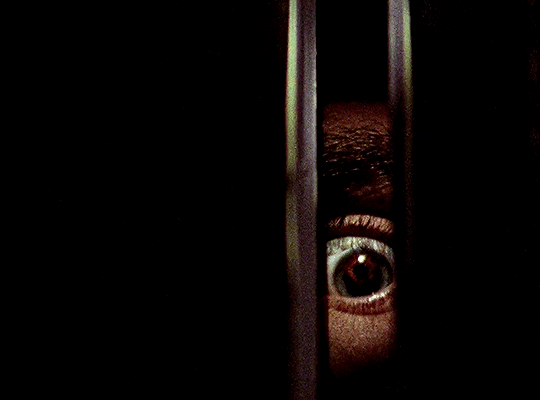
> you don’t love the idea of billy spending the night
> it’s not that you don’t love him, or being around him. he’s your boyfriend, of course you like his company
> it’s just that the sorority girls don’t have the greatest track record of giving you privacy
> they don’t cross boundaries, or enter without knocking- you lock the door anyways
> but they like you enough that usually they’re knocking on your door by eight, inviting you on a shopping trip or to breakfast or even asking for help studying
> it can be stifling, but it’s sweet, and it’s not like they’ll know you have a guest. they’d be more courteous if you could tell them
> and there’s the second reason, the one you can’t tell Billy
> you know the walls are paper thin, and you know just as well he’d take that as a challenge
> but it’s spring break, and only a couple of students are still about
> so you quite casually ask him if he’d like to stay the night
> you’ve never seen this man smile wider in your entire time with him
> and he’s surprisingly PG as you make plans
> he’s excited to eat popcorn and get his nails done and cuddle - you paint his hails black and get the snacks ready
> you rent a horror movie for the occasion, and he’s giggling the whole way through it
> he thinks it’s just adorable that you get so scared, hiding your face against him
> “Billy’s pretty baby is so silly- maybe he should distract his baby….-“
> luckily, you’re able to turn being as quiet as possible into a game when you mention how sound carries through the house
> and he’s ecstatic when he gets to stay next to you, tangled in the sheets and clinging to you for dear life
Danny Johnson

> you’ve never been to his place
> he started as a stalker, so it seemed natural he’d just keep going over to your apartment
> and since he’s always busy with the paper, and continuing his current murder spree…
> well most nights you just let him go, and when you don’t you wake up alone
> but on a particularly boring evening you decide to reverse the roles just a bit
> you figured out his address some time ago- and you picked up a thing or two about picking locks from dating Danny
> so it’s not a problem getting into his penthouse and making yourself comfortable
> you make sure to send a vague text that you knew he’d be able to figure out
> after all actually being sneaky around Danny was probably dangerous- you’re about the only person he wouldn’t stab on site
> you can’t help your huge grin when he stalks into his bedroom
> he’s acting pissy but you see the way his eyes survey your nearly bare body
> “You little brat…”
> he’s the fun kind of angry
> after a through lesson in asking permission you shower and collapse into bed together
> you cuddle close and fall asleep in his arms as he traces all your new bite marks and bruises
> he seems to get the message about staying - when you wake up it’s to him kissing your neck and purring your name
> apparently he didn’t finish last night’s ‘lesson’…and he’s eager to continue
Hannibal Lecter

> he’s eager for you to spend the night, in all honesty
> he likes being in control, utterly and completely
> if he had it his way, you’d move in within the month
> but even though you’ve brought a bag, and are all pj-ed up, he’s distracted
> maybe the one thing that can distract him from you is work- he’s a perfectionist
> and he doesn’t have to prove himself to you like he does clientele and state boards, and practically everyone else
> “y’know you said ten minutes ten minutes ago.”
> “yes my darling- i’ll be there shortly, just- go lay down-“
> you roll your eyes and instead stand behind him, wrapping your arms around his shoulders and beginning to kiss his neck
> he tries his damndest to keep focused
> “…if you don’t come soon, i won’t be awake enough to help you…unwind,”
> that gets him up- you 1, work 0
> you’re surprised when after you’ve both gotten nice and relaxed, he pulls you flush
> usually you have to ask for affection
> but he spoons you, face buried in your hair as he dozes off
#slashers#slashers x reader#slashers x you#house of wax#bo sinclair x reader#bo sinclair#friday the 13th#jason voorhees#jason vorhees x reader#billy lenz x reader#billy lenz#black christmas#dead by daylight#scream#danny johnson#danny johnson x reader#hannibal x reader#hannibal lecter#hannibal tv show#silence of the lambs
531 notes
·
View notes
Note
Hey, i've read a few of your slasher posts and i really like your writing. If you arent able to its perfectly alright but i was wondering if I could get a few slashers with a s/o that can't feel pain and so is unaware when they get hurt. It could be when meeting or having already known eachother. Thank you so much!
Reader out here like:
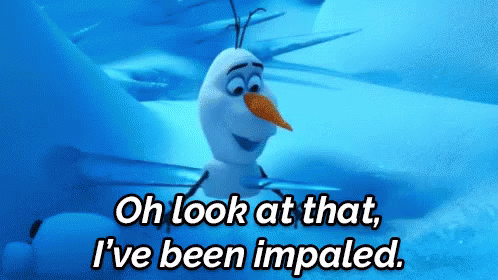
Michael Myers 🎃 (First Meeting)
He watched from the shadows as you pulled glass from your forearm, without even flinching.
If anything, the annoyed expression on your face was amusing to him. He'd seen many things in his life, but this was new.
For a moment he forgot why he was stalking you through the decaying house of his childhood. Instead he continued to watch as you searched for something to cover the wound.
It wasn't until your eyes met his, that emerged, holding a first aid kit in his hand.
Jason Voorhees 🏕 ( Dating)
Good lord, are you trying to give him a heart attack? I mean, he might already be dead, but still!
It was so innocent at first, you truly trying your hardest to keep up with himself during walkies. He's just got dem long ass legs.
Well next thing you know, you're on the ground and you're bleeding. Jason's panicking, you're not. He doesn't understand, he sees bone. Wtf?
Don't try to explain the science to him, he doesn't care. Now he's just worried about you not being able to tell if you're injured.
Hannibal Lecter🩺 (Before Dating)
Fully understand the science behind it. It may or may not be one of the reasons he was interested in you.
However, it wasn't until you nearly chopped a finger off helping him cook and look down and was like "K." that he felt worried.
Even if you're not accident prone, accidents happen. And you, not feeling pain which mean there's not properly connected in parts of brain that receive the pain messages, which means you might potentially-
He's spiraling in that science shit™️
#slasher x reader#michael myers x reader#jason voorhees x reader#hannibal lecter x reader#hannibal tv show#silence of the lambs#halloween 1978#friday the 13th
245 notes
·
View notes
Note
Could you do headcanons or a scenario with Daddy! Hannibal Lecter? Please and thank you! 😊
This is written so it could go for either Hannibal
Pairing: CG!Hannibal x Little!reader
Contains: GN!Reader, honorific (Daddy) used, CG/L dynamics, Littlespace, established relationship

Hannibal is a fantastic caregiver, very hands on and prideful
Being his little one means you’re always on your best behavior.
He is a stickler for manners tbh like straight up will make you right lines because you forgot to say please.
He doesn’t get angry, just simply tells you it was a wrong thing to do and he thinks 20 lines written in neat cursive will make you remember better.
You’re also dressed in the most adorable little outfits, things with comfy and colorful prints.
Hannibal also loooves spoiling his little one with any and everything tbh.
You wanted ice cream? He will take you to get the biggest size.
Hannibal also will not respond to you unless you call him daddy (in private or only when you’re little not 24/7 unless it’s a established part of your dynamic)
But he adores it when you call him that, his heart melts and he just wants to hold you close and give you the world.
He also will absolutely play with you.
He loves to color with you surprisingly, he always seems like the kinda guy who can’t be silly but sometimes he can.
#x little!reader#littlespace fanfiction#little!reader#xlittle!reader#slasher x reader#slashers x reader#silence of the lambs#hannibal#hannibal x reader#hannibal lecter#hannibal lecter x reader#hannibal agere#slasher agere#horror agere#fandom agere#agere fanfic
1K notes
·
View notes
Text
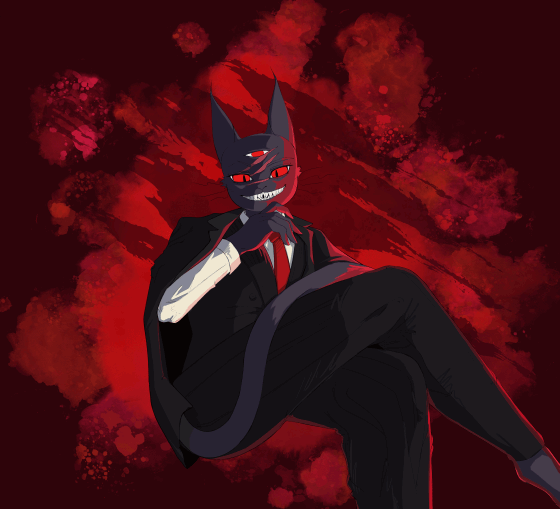
slasher! narinder collab i did with @cultoftheswag and @delirisse! i did the colours.
181 notes
·
View notes
Text
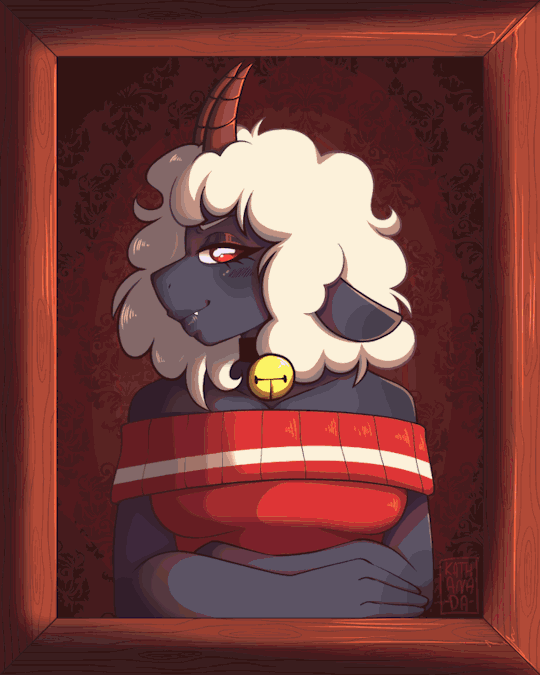
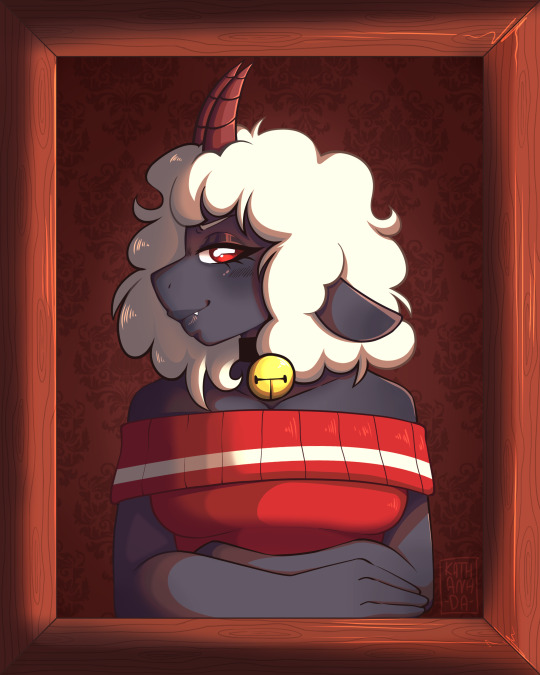
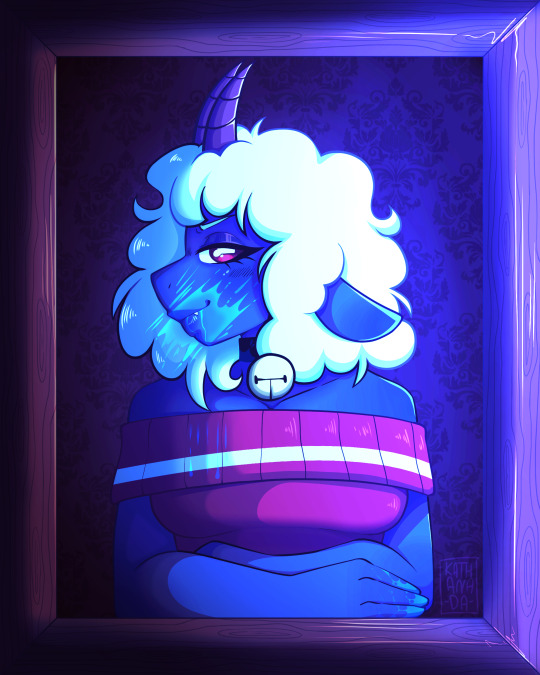
Mary belongs to @delirisse-au, @delirisse
She's cute <3
#cult of the lamb#cotl#cotl au#cotl lamb#cotl fanart#cult of the lamb fanart#cult of the lamb au#cotl slasher au#slasher au#cult of the lamb slasher au#epilepsy warning
224 notes
·
View notes
Text
▬▭▬▭▬▭▬▭▬▭▬▭▬▭▬▭▬▭▬▭▬▭▬▭▬▭▬▭▬▭▬▭▬▭▬▭▬▭▬
Slashers Love Languages
In which I go over some slashers love languages and why. :) Includes Thomas Hewitt, Michael Myers, Brahms Heelshire, Lester Sinclair, Harry Warden, SoTL and NBC Hannibal.

━━━━━━━━━━━━━━━━━━━
Thomas Hewitt
Quality Time ,, Thomas loves to spend time with you, whether it’s just by sitting in the same room to even doing the same activities. He just enjoys being around you and mentally pouts whenever he’s forced to move away.
Gift Giving ,, Thomas loves giving gifts to you, small trinkets he’ll find off his victims or around town. He’ll even try to make you some out of scrap metal and debris. He enjoys seeing your face light up whenever he gifted you something. It was a gratifying exchange.
Physical Affection ,, Although Thomas isn’t much of a physical guy, he does enjoy when you hug him or give him small kisses. The actions are always so sweet, it’s hard to not like them. He also enjoys giving affection, enjoying hugging you the most. He feels calm when he holds you, protective even.
━━━━━━━━━━━━━━━━━━━
Michael Myers
Gift Giving ,, Michael isn’t a man of words or touch, instead, he prefers to show his affection through the form of gift giving. When he’s stalking his victims, he often steals some of their belonging to bring to you, objects he thinks you’ll like.
Quality Time ,, Alongside acts of service, Michael enjoys spending time with you. He likes knowing where you are, being aware of your current status in case anything might change. He doesn’t say this but your presence calms him in ways he’s never been calmed. Its odd for him at first, but he learns to accept it and take it as it is.
━━━━━━━━━━━━━━━━━━━
Brahms Heelshire
Physical Affection ,, Brahms is a major physical person, always demanding attention in the form of hugs, kisses, or sometimes sex. He’s never been in a relationship before and has been starved of affection growing up, leaving him with a hunger that can rarely be fully satisfied. There is never a moment where Brahms isn’t touching you, even if the touch is small such as a hand gently holding the bottom of your shirt sleeve as he watches you cook.
Words of Affirmation ,, Brahms enjoys receiving words of affirmation. He enjoys being told he’s done something good. However, because he enjoys hearing those words so much, he assumes you would too, leading to him constantly affirming you with anything you do. Even if the action is pointless, Brahms will give you his approval. Even when you’re doing nothing, Brahms will give you his approval. Affirmations will spill from his lips more than they spill from yours.
Quality Time ,, Another love language of Brahms is quality time. He’s always scared that one day you’ll leave so he tries to stay near you as much as possible. He wants to hang out with, love you, for as long he can in case the worst comes to fruition.
━━━━━━━━━━━━━━━━━━━
Hannibal Lector (NBC)
Quality Time ,, Hannibal enjoys hanging out with you, speaking and getting to understand how you work. You’ve always been a curios subject for him, one that he wants to study until he knows you from inside to out. Spending time with you is one of the major ways Hannibal is able to accomplish this.
Words of Affirmation ,, Hannibal likes telling you when you’ve done a good job, when you’ve excelled in something you thought against. He also enjoys singing you praises when you’re alone, small things to bring a smile to your face. He likes physical contact but prefers to verbally express his affection to you. After all, words are his strong suit.
Gift Giving ,, Whenever Hannibal kills someone, he’ll save a souvenir for you, one he’ll give to you as a token of his love and appreciation.
━━━━━━━━━━━━━━━━━━━
Hannibal Lector (SOTL)
Acts of Service ,, Unlike the other Hannibal, this one prefers to provide you services instead of giving gifts. He enjoys helping you relax, taking stress off your shoulders, and more. He feels he needs to help you at time, still being mindful that you’re strong on your own. He wants to see you calm so he’ll provide any service he can to bring that want into play.
Words of Affirmation ,, Similarly to the NBC Hannibal, words of affirmation are a shared trait. Hannibal prefers to both receive and give words of affirmation. He likes to know that the love comes from both sides. If you don’t return his words, he’ll keep bugging you till you do.
━━━━━━━━━━━━━━━━━━━
Harry Warden
Physical Affection ,, Harry enjoys physical affection as much as anyone else, however, he prefers it in a more domestic setting. He enjoys sleepy cuddles while making breakfast, good morning/goodnight kisses, laying next to you while watching movies, and the gentle kisses he’ll give you on your forehead before he leaves. He likes seeing you happy and you never fail to show your smile when he caresses your skin.
Acts of Service ,, Harry loves to give you massages after you come back from a long day at work. He likes receiving them, however, he enjoys rubbing the stress out of you back more. He doesn’t like the fact you work so hard, wanting to provide from himself. However, due to your circumstances, you’re forced to work till it feels like your back will break. Harry, wanting to provide for you, will massage your back till it feels brand new, no matter how tired his arms get.
Gift Giving ,, Another one of Harry’s love languages is gift giving. He likes gifting you jewelry, especially necklaces because he likes the way it looks against the skin of your neck. He also enjoys the way your face would light up at the new piece, you’re always so happy to wear the jewelry his buys you. He thinks it’s cute the ways your eyes will shine at the jewelry, it brings him joy and causes his heart to swell.
━━━━━━━━━━━━━━━━━━━
Lester Sinclair
Gift Giving ,, Lester enjoys making little ornaments for you out of the remains of the animals. He’ll make necklaces and charms to hang on your belt. Whenever you wear his gifts, a mixture of pride and love will swell within him at the sight of you appreciating the gifts he crafted for you.
Quality Time ,, Outside of hunting, Lester is a sucker for quiet snuggles. He enjoys laying down with his head in your chest, you’re arms wrapped firmly around him. He likes to know that you’re laying right below him, happy to hold him as he rests his eyes after a long day of hunting. He deeply enjoys it when you rub his back, something that practically gets him purring like a cat.
Physical Affection ,, Lester is a major physical guy, enjoying anything as long as it means he gets to hold you, kiss you, or anything that allows him just to touch you. The mere contact of his skin against yours is enough to calm him. Whenever you move away, he deeply craves your touch until you allow him to touch you again.
━━━━━━━━━━━━━━━━━━━
That’s all for today. See you again soon <3

▬▭▬▭▬▭▬▭▬▭▬▭▬▭▬▭▬▭▬▭▬▭▬▭▬▭▬▭▬▭▬▭▬▭▬▭▬▭▬
#fluff#gender nuetral reader#brahms heelshire#slashers#thomas hewitt#thomas hewitt x reader#the boy 2016#brahms x you#thomas hewitt x you#michael myers#michael myers x reader#hannibal lecter#hannibal nbc#silence of the lambs#harry warden#harry warden x reader#my bloody valentine#texas chainsaw the beginning#headcanon#love langauges#lester sinclair#lester sinclair x reader#house of wax
887 notes
·
View notes
Text
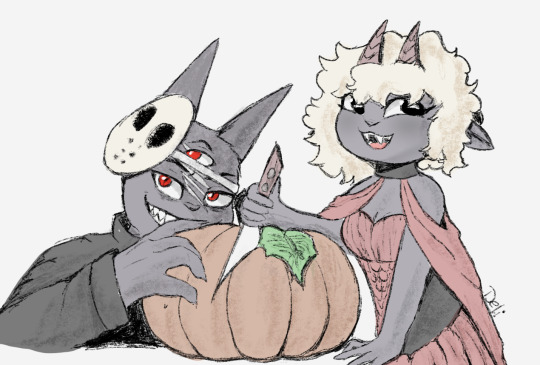
Happy Halloween!
#cotl#cult of the lamb#cotl narinder#Narinder#cotl lamb#cotl slasher au#slasher!narinder#slasher!lamb#they’re wearing costumes this isn’t their regular fit#jubilart
192 notes
·
View notes
Text
#slashers#texas chainsaw massacre#friday the 13th#halloween#the boy 2016#black christmas#scream#house of 1000 corpses#nightmare on elm street#house of wax#silence of the lambs#leatherface#jason voorhees#michael myers#brahms heelshire#billy lenz#billy loomis#stu macher#freddy krueger#vincent sinclair#bo sinclair#lester sinclair#hannibal lecter#chop top sawyer#thomas hewitt#asa emory#chromeskull#all i can think of atm//#i have work in 2 hours
231 notes
·
View notes
Note
What's Lamb personality in your AU? Does they despise Narinder? What is their relationship?
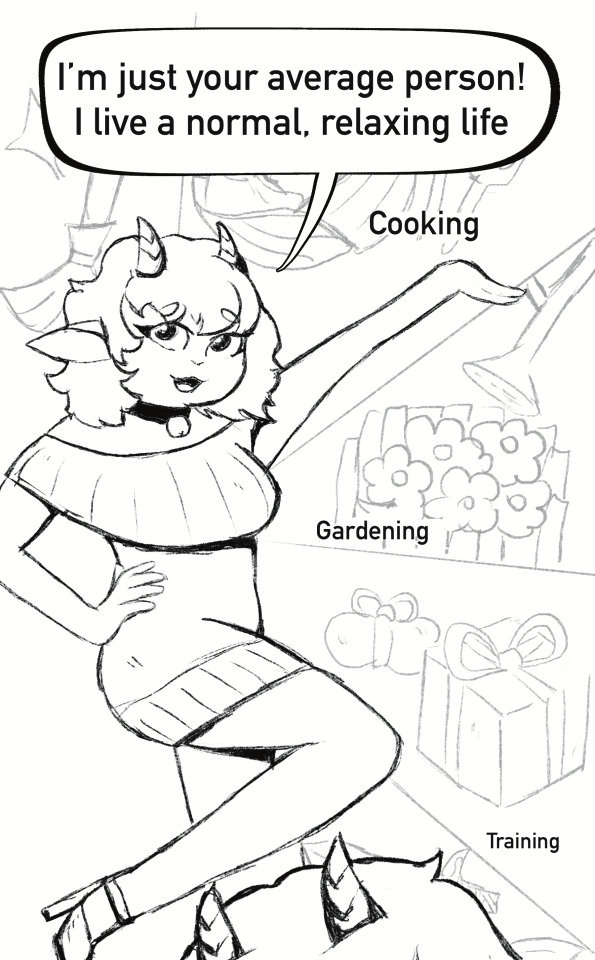
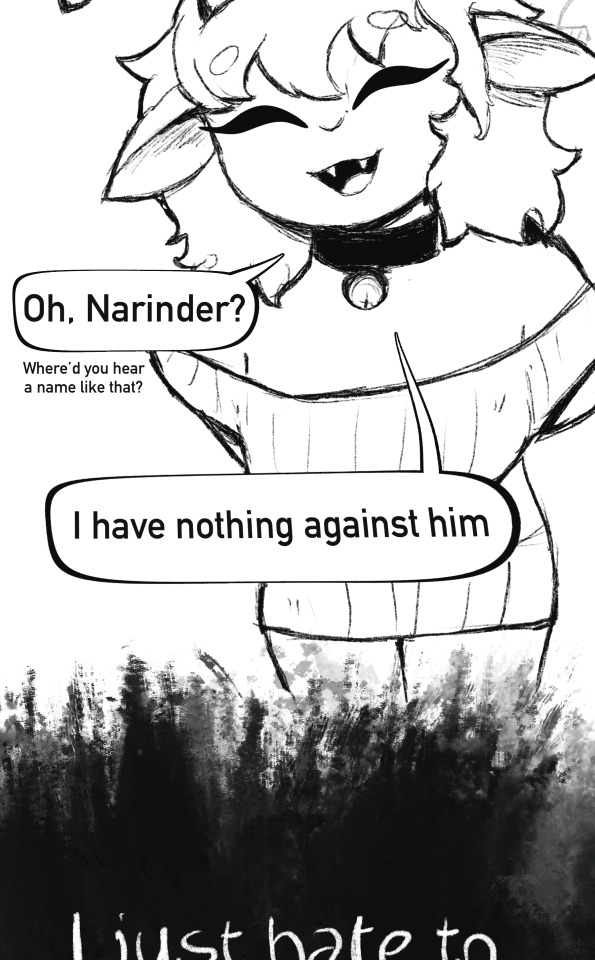
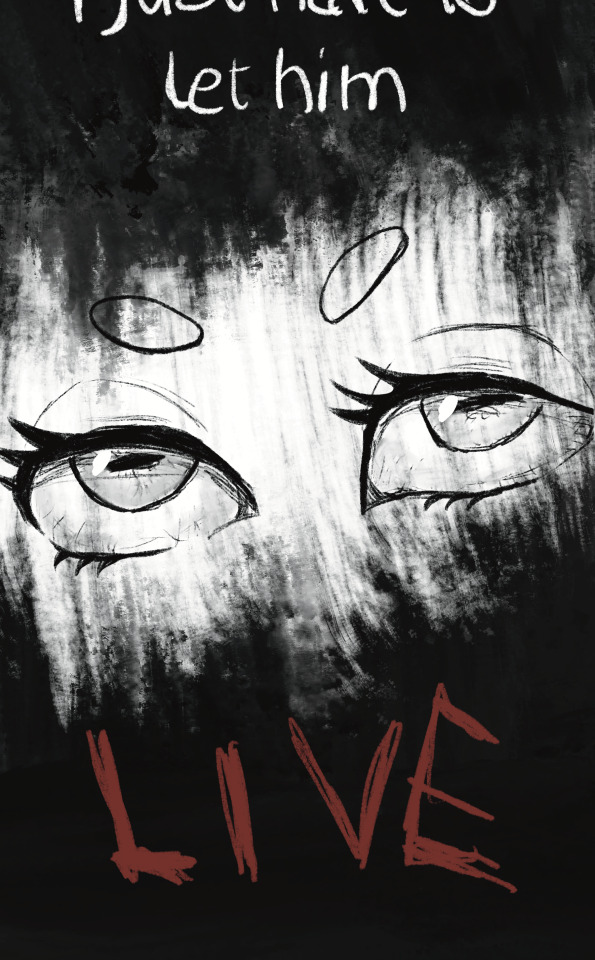
#cotl#cult of the lamb#cotl lamb#the lamb#cotl slasher au#asks#jubilart#I have a small hunch that she does despise him#mary
182 notes
·
View notes
Text
♡ slashers scenarios | y’all accidentally adopt a kid (part 2)
♡ fandoms; House of Wax, Hannibal (TV)/Silence of the Lambs, slashers (general)
♡ characters; Vincent Sinclair, Bo Sinclair, Hannibal Lecter
♡ reader; gender neutral
♡cw; parenthood, kidnapping, mentions of violence. basically don’t tell these guys you want a kid ig
♡notes; another sparse selection but i don’t think Billy Lenz is allowed within 100 yards of a school so it is what it is
also I hate how much I’m starting to love Bo oh my god
•┈••✦ ❤ ✦••┈•
Vincent Sinclair
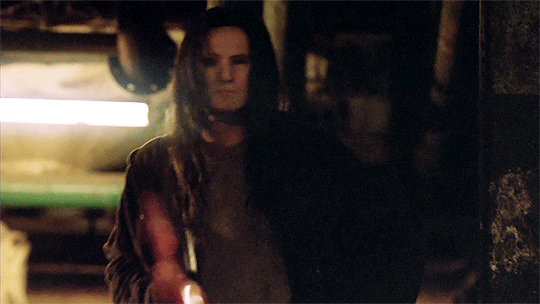
> he’s a nurturing man- to his brothers and you
> hell he babies Jonesy too
> even so, he’s shocked when you mention offhandedly that he’d make a good father
> he denies it vehemently
> even as the golden child he grew up in hell
> no way he’d know how to do any of it right
> but you just gently laugh and shake your head, insisting but not pressing it
> it makes him think
> and think and think
> he didn’t know much about kids, but you’d be a great parent
> and you wouldn’t lie to him- maybe he’d be at least an okay father
> families don’t come through often
> and when they do, Lester leaves them be
> if they ever get to Ambrose on their own, the town stays off- none of the Sinclairs want anything to do with harming children
> but mistakes happen, and Bo is freaking out
> a little girl with dark hair and bright blue eyes was sleeping in the back of a car while he took care of her parents, and he didn’t realize until far to late
> she’s maybe 3, and awfully scared and quiet- but when they bring her in the house she walks right up to you and Vincent
> she hugs your leg and finally smiles when Vincent kneels down to show her that Jonesy is a nice dog
> Bo is in shock when you volunteer to adopt her, but Vincent is in quick agreement
> she’s nonverbal, but you look through her family’s things to find out her name - Lilly Henson, or something to that affect .
> Lilly Sinclair has a much better ring to it anyways, doesn’t it?
Bo Sinclair

> he’s the type that if you mention that you want a kid to this man, he asks what color
> he is endlessly devoted to you
> and while he never wanted a kid before, he’s always so insistent you make him a better man
> so some snot nosed brats would complete the picture perfectly
> he’s not super serious about it, not really
> you have plenty of time to plan for a family
> and he’s the type to want biological children if possible- he’s so used to white picket fence suburbia-type ideals
> when a car pulls up to the gas station, he stops when he sees the infant car seat in the back
> he’s about to tell the parents to move along- but then he sees the second matching one
> something - probably his overinflated self worth - tells him he’d be a much better father to twins that these chucklefucks
> and you want a kid anyways! would two be much better
> they’re not identical- he’s not not disappointed by the fact, but they’re still adorable
> a boy and a girl a bit over a year, with big brown eyes and infectious giggles
> he’s beyond proud when he strides in with them
> “daddy’s home!”
> he thinks you might actually kill him this time
> but then Charlotte - the girl based on what’s embroidered on her blankie, reaches for you and you melt
> you’re still scolding him as you happily take Theodore too
> but he knows you’re beyond thrilled
Hannibal Lecter
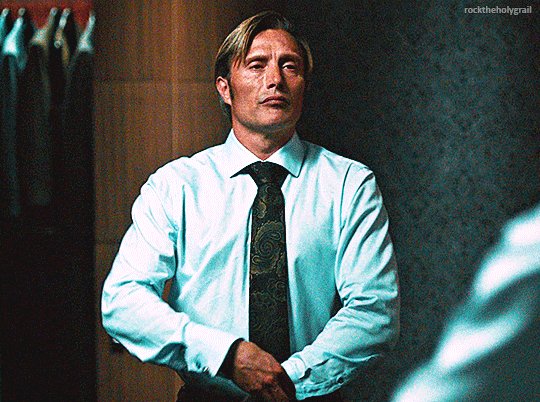
> he’s always wanted a successor
> quite frankly it never had to be his child - or a child at all
> he thought about taking younger serial killers in the making under his wing more than once
> to teach them the art of culinary cannibalism and the finer points of flaying people
> but it’s far too dangerous - especially with you around
> you’re the one thing that trumps his egomania
> so he lets it be for the time being
> but one day, he takes on a special case at work
> a young boy who recently lost his parents very violently
> he’s in kindergarten, and expresses most everything through his rather advanced drawings
> you don’t interact with his patients- even though he works from home you’re pretty skilled at dodging them
> but on the way out that afternoon the little boy- Peter, his name is, runs out before his social worker and smack dab into you
> she apologizes on his half profusely but you’re so sweet with the boy
> you pick up his dropped drawings and comfort him- he’s quite upset he may have hurt or angered you
> he gives you a huge hug and Hannibal can see the fond, parental look on your face
> after that it’s quite simple to draw up the paperwork
> he’s already in foster care, and it only takes a few false documents to make the courts think that Hannibal’s custody is the best place for little Peter
> you learned long ago that it’s best not to question how or why Hannibal does something when he gets like that
> and either way you’re content with your new little family
#slashers#slashers x reader#slashers x you#vincent sinclair x reader#vincent sinclair#bo sinclair x reader#bo sinclair#house of wax#hannibal lecter#hannibal x reader#hannibal#silence of the lambs#cw kidnapping#cw mentions of death#jonsey sinclair
231 notes
·
View notes
Text
Red Dragons; Or, the problems of adaptation and the early serial killer procedural
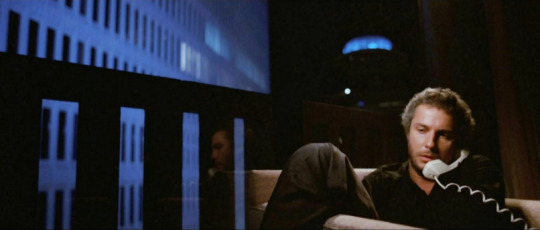
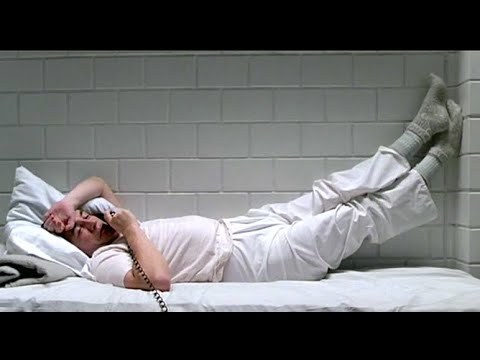
Red Dragon (1981) has the distinction of being the most frequently adapted Thomas Harris novel in the Hannibal Lecter "quartet." Despite the universal recognition of Jonathan Demme's Silence of the Lambs (1991), with iconic performances from Jodie Foster and Anthony Hopkins, and the more recent cult status of the series Hannibal (2013), which draws from all four books, it's Red Dragon, in some ways the most "obscure" Thomas Harris novel, that has lived three, arguably four, different lives onscreen over three decades.
Manhunter, visually, is an 80s noir feast set to atmospheric synths, but works within the newly established slasher genre as it attempts to make its own mark. The 1980s were truly the decade of the slasher flick, or the first wave thereof, and Red Dragon had to contend with expectations set up by the likes of Freddy Krueger and Michael Myers. Although this isn't a write-up about the history of slasher films, the basic premise I am going with is that the early slasher serial killer was portrayed as monstrous and, compared to our favorite killers today, one-dimensional antagonists. When I think about the origins of the slasher genre, I always think about the way the ineffectual psychologist in Halloween (1978) describes his former patient's "devil's eyes," behind which lived something "purely, simply evil." Dr. Loomis is dogged in his determination to impress upon the local authorities that Michael Myers is a force of nature who is unreachable by psychology, the study of the human mind. Furthermore, the slasher flick was unconcerned with the elements of the procedural: like in other horror subgenres, law enforcement are disposable foils that demonstrate the danger of the "monster" and the vulnerability of his targets and/or come in at the end to mark the conclusion of the spectacle (until the sequel, that is).In many ways this just seems like a quirk of history. I've been operating under the assumption that when Red Dragon came out in 1981, Thomas Harris introduced a type of story to a media landscape that had scant precedent for the serial killer mystery or procedural, distinct from the related nascent slasher horror subgenre, unlike today when a plethora of "murder shows" benefit from the success of this formula. Hannibal "the Cannibal" Lecter, the ur-murderer of the Thomas Harris fictional universe, became a cultural archetype that looms over modern crime television and film as he does over the investigations of beleaguered law enforcement officials in both Red Dragon (1981) and Silence of the Lambs (1988). When Michael Mann brought this first "Hannibal" novel to the screen in 1986, he too was breaking ground, to mixed reactions. Manhunter (1986), which lamentably lost its "Red Dragon" title due to studio publicity decisions, is both ahead of and a product of its time.
Manhunter, visually, is an 80s noir feast set to atmospheric synths, but works within the newly established slasher genre as it attempts to make its own mark. The 1980s were truly the decade of the slasher flick, or the first wave thereof, and Red Dragon had to contend with expectations set up by the likes of Freddy Krueger and Michael Myers. Although this isn't a write-up about the history of slasher films, the basic premise I am going with is that the early slasher serial killer was portrayed as monstrous and, compared to our favorite killers today, one-dimensional antagonists. When I think about the origins of the slasher genre, I always think about the way the ineffectual psychologist in Halloween (1978) describes his former patient's "devil's eyes," behind which lived something "purely, simply evil." Dr. Loomis is dogged in his determination to impress upon the local authorities that Michael Myers is a force of nature who is unreachable by psychology, the study of the human mind. Furthermore, the slasher flick was unconcerned with the elements of the procedural: like in other horror subgenres, law enforcement are disposable foils that demonstrate the danger of the "monster" and the vulnerability of his targets and/or come in at the end to mark the conclusion of the spectacle (until the sequel, that is).
Manhunter, and Red Dragon generally, is not a slasher flick. In fact, beyond the deliberately provocative reporter Freddy Lounds and a few men with barely any screen time who are killed off in brief fight scenes, the Great Red Dragon doesn't kill anyone at all. At the very least, no one is murdered in his signature serial killer style. The ritualistic murders occur before the film (and novel) begins, and the narrative revolves around understanding the mind of the serial killer and preventing him from killing again. At the same time, the conventions of the slasher film seem to limit the directions the film can go. Both Francis Dolarhyde and Hannibal Lecter (or "Lecktor") in the film have fairly opaque inner lives and limited screen time, while Thomas Harris notably does delve into the mindset and motivations of the "psychopath," positioning the killer as a subject of psychology, rather than an exception to it.
Furthermore, Manhunter's revised ending reframes one of two major female characters as a recognizable "final girl," and relegates the other to only existing in Will Graham's "happy ending," out of reach for the killer. This is the opposite outcome of the actual ending in the novel, and always seemed a bit tacked on to me, and not for artistic reasons. Will Graham can't actually end up broken and haunted because there has to be a clear demarcation between the serial killer "monster" and the "real" people who survive him. Blurring that distinction is, arguably, the "point" of Red Dragon. Michael Mann, perhaps, couldn't adapt the novel's conclusion "faithfully" because the conventions of this kind of psychological thriller weren't established, and did the best he could, introducing new building blocks for the "serial killer" archetype but not successfully pitching them to the wider public. Manhunter was not a financial or critical success upon its release, and refining the Thomas Harris "blueprint" was left to Jonathan Demme's Silence of the Lambs (1991), which made the strategic and hugely significant choice of allowing Hannibal Lecter to become a breakout character.
The next adaptation of the novel Red Dragon has seemed to me, frankly, like a bit of a cash grab. The 2002 Brett Ratner film, starring Edward Norton and Anthony Hopkins, capitalized off of the success of Silence of the Lambs and the release of a new Thomas Harris Hannibal Lecter novel. This film was for those who missed Manhunter in the 1980s, which many did, and those who considered a prominent Hannibal Lecter played by Anthony Hopkins essential to an adaptation, which many also did. The most recent adaptation of Red Dragon is the cult hit drama Hannibal (2013), which focuses on the main characters of the novel, Hannibal Lecter and FBI profiler special agent Will Graham, and can arguably be seen as two different adaptations of the novel. Both of these more recent adaptations are more coherent and recognizable as exemplars and/or subversions of the serial killer procedural, playing off of the tropes introduced to the genre by the source material itself, like a particularly grizzly and morbid ouroboros.
So, we have many points of data to consider if we wanted to determine what makes a good adaptation of the novel Red Dragon.
Ironically, for a story that laid important groundwork for a whole subgenre of film and TV, Red Dragon is hard to adapt and definitely hard to update. (So is Silence of the Lambs for that matter, but that is a whole other kettle of fish.) To my mind, the main two difficulties stem from both a strength and a "weakness" of the original novel.
A strength: Harris takes advantage of contemporary technology to create a clever mystery at the center of the novel. The problem: this particular bit of technology was only truly at home in its first 1986 adaptation, Manhunter. Both Red Dragon (2002) and Hannibal (2013) had to make compromises to adapt the central plot device. Red Dragon (2002) avoids the issue by simply setting the film in the 1980s, relying on the audience's knowledge of VHS technology of that time, which, since it was 2002, was more or less assured for an R-rated movie. Hannibal (2013) sidesteps the issue more or less entirely by making the "mystery-solving" pieces functionally irrelevant. (At one point, Hannibal Lecter makes a dismissive reference to the killer using "social media" the way the original story used VHS and the matter never comes up again.) To date, this central plot twist has never been successfully adapted for contemporary audiences in the 2010s - or 2020s for that matter. The 2010s show itself, in its choices, implicitly makes the argument that the technical "mystery" elements of novel weren't really all that important to its overall message. Depending on your point of view, this argument is successful. However, this argument also depends on the irony that the creators of the show can dispense with the set pieces of the serial killer procedural and take artistic license because the source material introduced those expectations into the genre to begin with. Tradeoffs all around.
Another challenge to adaptation is sometimes considered a "weakness" of the book: after the real "plot" of the novel vis a vis Will Graham's hunt for the "Tooth Fairy" begins, Harris makes the bold choice of adding the point of view of the serial killer du jour himself, diving into the eponymous Red Dragon's motivations and experience, which almost takes place in a parallel universe apart from that of Will Graham, Lecter, and the BSU/BAU until both narrative threads collide in the climax. The problem: this choice "derails" the suspense of the whodunit and adds character development for a relative stranger to the reader. Every adaptation of Red Dragon changes the structure of the plot so that the parallel storyline of Francis Dolarhyde, the Red Dragon, is pared down and interspersed with the main narrative (usually) earlier on. Every adaptation has decided that Thomas Harris's precise plot structure isn't actually essential. This judgment call is also ironic: Thomas Harris apparently "flubs" the standard conventions of the serial killer procedural that did not yet exist because he was in the middle of inventing them.
But, we may ask, isn't this the nature of adaptation? The answer: of course it is. Adjusting plot mechanics based on the period of the adaptation and restructuring the pacing for film/television are some of the most basic changes one can make when adapting a book for the screen. However, that does open up interesting questions of theme and intent. What is essential to the Red Dragon story? What is it, in the end, all about?
Leaving aside all caveats about the subjective nature of interpretation or the possibility of a work being "definitively" about anything, I believe there are two broad interpretations of the novel and all existing adaptations favor one or the other.
Red Dragon is a novel about how much monster there is in a, well, man and vice versa: the fate of the soul is at stake. This is a clear theme of Will Graham and Hannibal Lecter relationships in every iteration: to catch a particularly "monstrous" killer requires understanding said killer, but if you understand them too well, what does that say about you? And, more importantly, where does that leave you? (In the original Will Graham's case, nowhere good, with a broken marriage and an existential crisis, or, when we catch up with him in the sequel, in the Florida Keys, now a miserable drunk. For the modern Will Graham of the 2010s series, TBD.) Empathy itself instills horror, which is a fairly complex idea to explore in the late 1970s when Thomas Harris was writing the novel. (In fact, I will always find it remarkable that Thomas Harris had the foresight to research the methods of criminal profilers at the FBI at the beginning of the discipline and the BSU itself, getting in on "the ground floor" for better or worse for horror fiction and actual forensic psychology.) It's also very cross-media, as identification with violence on screen (and the "male gaze" itself) were emerging as key features and problems of film available to critique. The focus on "video" and boundaries between self and other in the novel seem very prescient.
Alternatively: Red Dragon is a novel about the limits of personal transformation. Thomas Harris seems preoccupied with the idea of ritual murder as an alchemical process motivated by the desire to become something "transcendent." (While one can see the mystical whimsy in a man thinking he's becoming a dragon, a figment of William Blake's imagination, "Buffalo Bill's" or Jame Gumb's desire to transform "into a woman" in a somehow "not-trans" way in Silence of the Lambs falls egregiously short and reflects more on a failure of imagination on the part of Thomas Harris and his readership than anything else.) I find the metaphysical aims of these serial killers interesting for two reasons. First, sexual sadism is de-emphasized as a motive, which is not typical of the serial killer archetype of the time: the most prominent serial killers in fiction (such as in early slasher films) kill because of some perverse urge, as an extension of the "evil" men they are or were made to be. Their murders aren't about anything. Both Francis Dolarhyde and Jame Gumb , in contrast, think they are setting out to accomplish something and that the brutality of their actions is beside the point. This is what constitutes their insanity, as this is clearly not true.
The actual nature of their murders and the ugly psychoanalytical implications of their compulsions are the ultimate limitation on their aspirations to "becoming." No matter what they think is going on their heads, they direct their violence toward women, and it is women who ultimately put an end to their reigns of terror. (Molly Graham and Reba McClane in Red Dragon and Clarice Starling, among others, in Silence of the Lambs.) The female characters serve as a "reality check" for the dreamy, bloody men of the books, which is earnestly ham-fisted on the part of Thomas Harris but also significant for the genre. Arguably none of the women in the first two Hannibal novels play the role of "final girl," that is, an "innocent" woman who acts as audience surrogate and restores socially acceptable norms at the end of the film. (The focus on such a "good girl's" experience means you can take a comfortable distance from the murderer and put yourself in the position of "victim." You are also anticipating that she will be spared in some way, which restores a sort of moral balance to the universe: the other victims in some way "had it coming.") In Red Dragon, the active female characters are not sorted into the "virgin/whore" dichotomy: in fact, even the actual sex worker character (Freddy's girlfriend) remains unscathed, and her feelings are more relevant to the other characters than her occupation, humanizing Freddy postmortem. The victims and potential victims, almost all of them mothers, clearly did nothing "wrong" and their sexual objectification is placed squarely on the shoulders of the men watching them. The women left standing at the end of the novels don't just "escape" the killers: they're the ones who put the killers down despite the male characters' inadequacies, and they, unlike a Jason or a Michael Myers, stay down.
Of course, I think both broad themes are very present and active in Red Dragon, and, probably unsurprisingly, Hannibal Lecter is something of a cipher for both threads. If our main concern is coming to terms with our empathy and capacity for violence (or "men's," I suppose), Hannibal Lecter nimbly eludes being a subject of empathy, instead setting himself up as the observer and interpreter of other killers. His insight into other people is certifiably superior: he's literally a renowned psychiatrist. The possibility of a Hannibal Lecter raises the stakes enormously for our own navel-gazing, as we are not just wondering, along with Will Graham, whether the wicked deeds of others might appeal to us, but are actually facing up to the reality that the killer has been beside us as a peer all along, not the subject of scrutiny. If our main concern is the limitations of personal transformation, Hannibal Lecter is a very sharp foil for our doomed killers because while he can easily identify the signs of a transmutation complex, it isn't especially relevant to him personally. Hannibal Lecter doesn't kill and eat people because he's turning into anything. As he famously tells Clarice Starling as she attempts to interview him, "Nothing happened to me. I happened." He already is what he is, rooted in sensual reality - like the women in the books - and he is merely indulging his appetites and aesthetics. This, I think, is why he prevails and why he can make himself at home on the side of our woebegone detective protagonists when he feels like it. Hannibal Lecter is never doomed: he can always happen to you.
Manhunter favors the first tendency, and is not particularly interested in Francis Dolarhyde's "Becoming" as the Great Red Dragon. This allows for a very intense and nuanced meditation on identification and the role of empathy that artistic representations of violence invoke. The focus on "seeing" gains a whole other dimension in the context of film, as there are many interesting things going on with perspective and scene composition. 2002's Red Dragon favors the second tendency, if I had to make the judgment call. Although the film is probably the most "faithful" adaptation of the events of the novel, I do think you can come away from the film not remembering that Will Graham has any particular problem/gift of heightened empathy or that losing himself by identifying with Hannibal Lecter or Francis Dolarhyde was ever a serious possibility. (Even at the climax, when Graham to a "violent" place he ends up taking on the persona of Dolarhyde's abuser, not Dolarhyde himself, which is entirely an invention of the film.) What the film does emphasize is the quixotic journey of Francis Dolarhyde, giving quite a lot of room to his backstory as well as his inner conflict between his deadly, "spiritual" inclinations and his romance with Reba. Also, and most importantly, this is the one adaptation of Red Dragon that actually allows Molly Graham to kill Francis Dolarhyde when he tries to make the Graham family another ritual sacrifice. There's an intentional symmetry in the novel between the murders and Dolarhyde's ultimate demise at the hand of the desirable "mother," which really underlines the juxtaposition between the story Dolarhyde is telling himself and what he's actually been doing.
Perhaps this is me tying a bow on it all by claiming that Bryan Fuller's Hannibal (2013) manages to incorporate both major themes, but I do think it's very interesting to at least think of the series as two different adaptations of Red Dragon. The first adaptation is obvious: the second half of season 3 "does" Red Dragon, and honestly gives fantastic depth to Francis Dolarhyde's inner world and his quest for transformation through death. However, I also think you can view the entire series as a whole as an adaptation of Red Dragon. I say this because the main bulk of the existing seasons of Hannibal cover the period of Will Graham and Hannibal Lecter's relationship prior to Lecter's capture, which is only depicted (in exposition) in the novel. Aside from the incorporation of various plot points and characters from the novels Hannibal (1999) and Hannibal Rising (2006) in season 2 and season 3, one could place the (first) three seasons of Hannibal entirely in the world of Red Dragon. I think this is especially suggested in the first episode, which opens with Will Graham doing a visionary walk-through of a family annihilation that pretty much exactly hearkens back to his first major scene in the novels and the films: later in the episode, Graham's inner monologue about imagination and taste - the first substantive insight we get into the character - is rewritten as dialogue between Graham, Jack Crawford, and Hannibal Lecter. So, even while the plot of the series begins at a different point in time, stylistically, we're back at the beginning of Red Dragon anyway. This interpretation allows for a lot more flexibility if we're looking for major themes coming from the source material. Identification and empathic intimacy are the animating features of the central Will-Hannibal dyad: at the same time, the psychic landscapes Will Graham (and to a lesser extent characters like Alana Bloom or Bedelia du Maurier) explore alongside Hannibal Lecter are tied up in questions of transformation and limitation.
In the series, Lecter not only pinpoints the urges to "become" in other killers but also becomes deeply invested in Will Graham's capacity for metamorphosis as an expression of identification and intimacy. If, as I've suggested previously, Hannibal Lecter exists as a grounded corrective to the soulful longings of murderers who wish to change through the deaths of others, this seems like a contradiction on its face. However, if we take this interpretation of Hannibal Lecter in the novels into our viewing of the series, the tension between Hannibal and Will sharpens into a very intimate exchange of knowing and refusing to know one another. Hannibal Lecter seems to have no interest in Will Graham becoming something or someone else via the alembic of murder. When he tempts Will, he is not (ultimately) encouraging the profiler to look away from the world to some impossible dream that would mark him for death like the other murderers they hunt together. Hannibal Lecter is very interested in Will Graham becoming a killer, that is, embracing all of who he already is with clarity and insight, which is a transformation rooted in psychology and is also entirely possible. Will then resists self-knowledge, or bringing his self-knowledge into the material world. Hannibal resists his own identification with another human being, and realizes (a bit too late) that there may be a way to bring Will down to Earth (and closer to him) without destroying him, as he inevitably does - gleefully - to his other proteges and projects.
No adaptations of Red Dragon have embraced the novel's ending. In the end of the original novel, Will Graham is left in the hospital, resigned to the fact that he's lost his wife and stepson, and drifts into a drug-induced dream state, where he doesn't dream of "Molly leaving" or Dolarhyde, but rather visits a memory from the time shortly after he'd killed Garret Jacob Hobbs. He remembers visiting Shiloh, the site of a particularly bloody battle in the American Civil War, and has an epiphany. At the time, he'd considered the battlefield "haunted," but now realizes that it is, in fact, "indifferent." In the natural world, there is no mercy, "we make mercy": "There is no murder. We make murder, and it matters only to us." Graham accepts that he has the capacity to "make murder; perhaps mercy too." Murder, however, is what he understands. He wonders if "vicious urges" in humanity and the "dark instinctive knowledge" of those urges could act as a vaccine against the "virus" of violence, allowing for the possibility of civilization that has "overgrown the basic reptile brain." He doesn't settle on an answer, but does believe he was wrong about Shiloh. "Shiloh isn't haunted - men are haunted. Shiloh doesn't care."
Granted, this would be hard portray on screen. A filmmaker would have to resort to voice over, perhaps, or merely suggest where Thomas Harris declares. Another option would have Will's epiphany take the form a letter to Hannibal Lecter, an answer to a message Graham never receives. In this letter, which Jack Crawford destroyed, Lecter says we live in a "primitive time," "neither savage nor wise. Half measures are the curse of it. Any rational society would either kill me or give me my books." He wishes Graham a "speedy convalescence," and hopes "he will not be too ugly" after recovering from the wounds the Great Red Dragon gave him. "I think of you often," he writes, and then writes his name. Lecter believes "half measures" are the true poison: Graham, if he knew his dream was a reply to his counterpart, would perhaps take the position that "half measures" are the antidote, a strategic ambivalence that, perhaps, makes mercy as possible as murder. Such a reply, however, would lack conviction. It would, however, betray that in the end this is a conversation vulnerable to distance and time and that there is no appeal to a higher power or state of enlightenment, just to one another. Perhaps the last scene of "The Wrath of the Lamb," the final episode of season 3 of Hannibal, is the closest we'll come to seeing a cinematic portrayal of this conclusion. The profiler taking the serial killer into his arms, where they hold each other like lovers, and then throwing both of them off a cliff and into the sea. Not a half measure at all.
In the meantime, all of these versions of Red Dragon are worth a look.
#nbc hannibal#hannibal lecter#will graham#manhunter 1986#red dragon#thomas harris#silence of the lambs#slashers#francis dolarhyde#murder husbands#essay#fadserver#hannibal meta
62 notes
·
View notes
Text

a nari design made for @delirisse <3
alternatives below :3
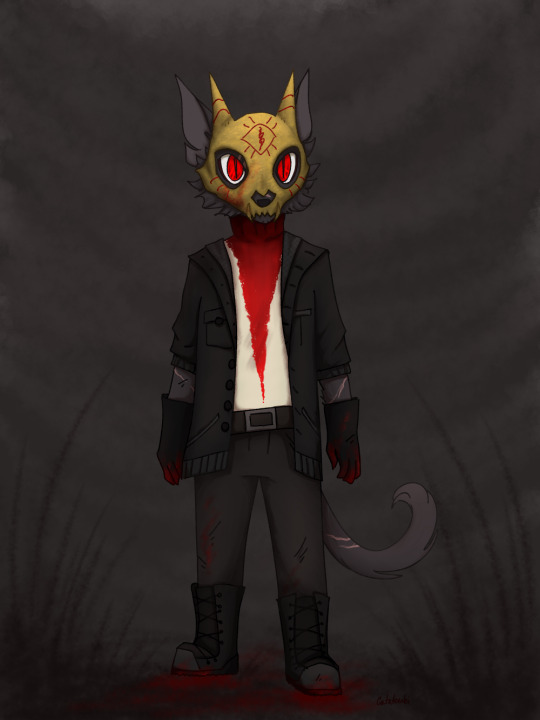
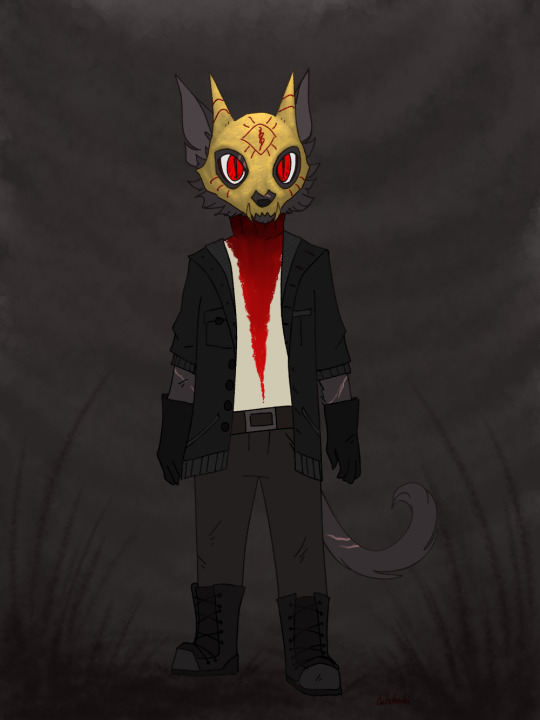

some flat versions includes for reference sake !! the mask was designed by our friend pavi !!
#narinder#cult of the lamb#cotl#cotl narinder#cult of the lamb au#the one who waits#cotl fanart#cult of the lamb narinder#slasher au#cotl au#cotl art#thank you for trustin me with ya boy <3#tw blood
82 notes
·
View notes
Text
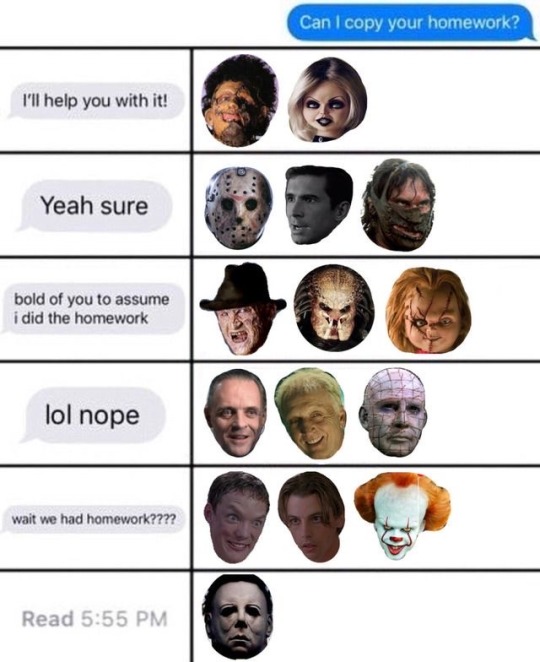
#pinterest memes#slasher memes#billy loomis#freddy krueger#meme#nightmare on elm street#slashers#stu macher#tiffany valentine#chucky#bubba sawyer#pennywise#norman bates#psycho 1960#hannibal lecter#silence of the lambs#jason voorhees#michael myers#predator#pinhead#billy loomis scream#stu macher scream#scream 1996#thomas hewitt#texas chainsaw massacre
91 notes
·
View notes